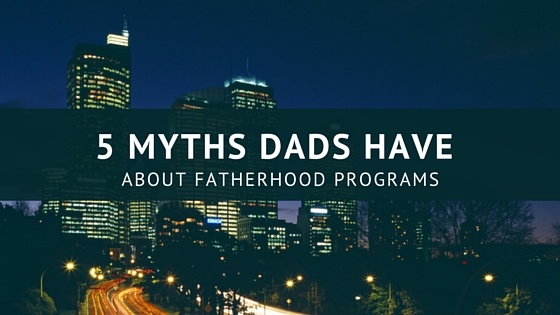5 Myths Dads Have About Fatherhood Programs
2 min read
Date Published: 05/04/2016
Last Updated: 05/18/2018
National Fatherhood Initiative Blog / Latest Articles
2 min read

Facilitators across the country have shared with me consistent challenges they’ve faced with dads’ attitudes about fatherhood programs. I’ve categorized these challenges into 5 myths that can help you more effectively recruit and retain dads in your programs.

Myth #1 – This is a group for men who are not good dads. Some dads see fatherhood groups as a clinical intervention that is only meant for absent, uninvolved dads. You should emphasize in your verbal and printed messages that the program is for any dad looking to be a better dad regardless of their current relationship status with their children.
Myth #2 – I’ve made too many mistakes and can’t be a good role model now. Some dads haven’t been involved with their children in years and may question how they can be good role models now. Emphasize that the only thing these dads can control is right now. As dads begin to build their fatherhood and relationship skills, they will increase the probability for healthy interactions with their children in the future. Everything they do from this moment on will define what kind of role model they become for their children and reinforce how to make healthy changes.
Myth #3 – I can’t become a better dad because I don’t have access to my children. Some dads live far away from their children or may be incarcerated. The natural reaction is to think they wouldn’t be able to apply what they learn from a fatherhood program. Encourage these dads to:
Myth #4 – I don’t need to participate in all of the program sessions. Many dads find it difficult to commit to the 8 – 12 sessions that make up most fatherhood programs and may even think all of those sessions aren’t necessary. You can emphasize at the beginning of the program how each session builds off of the other and that you have an expectation dads will attend every session. Some programs will drop participants if they miss a certain number of sessions. For dads who miss an occasional session, you can provide a one-on-one session to cover the key concepts that they missed to keep them up to speed. NFI’s 24/7 Dad®, InsideOut Dad®, and Understanding Dad™ programs have been used in both group-based and one-on-one settings effectively.
Myth #5 – A female can’t be an effective facilitator of a fatherhood program. Some dads may have an issue with a female running their fatherhood program. The fact is that there are many females running fatherhood programs effectively. If you’re a female, the most important skill is establishing trust and respect. You can also:
I hope you are better able to identify and address these myths with the dads you serve. As a result, you may find more dads joining and coming back session after session.
Have you encountered any of these myths? What other myths have you encountered that dads have about fatherhood programs?
Are you a dad looking for help? Please visit our Fatherhood Program Locator™ and enter your city and state on the map to find programs and resources in your community.
Date Published: 05/04/2016
Last Updated: 05/18/2018
Download the ebook to learn how to create fatherhood initiatives that engage every sector of community life.

Train Your Staff
Fatherhood Programs
Fatherhood Data
© 2025 National Fatherhood Initiative®. All rights reserved.